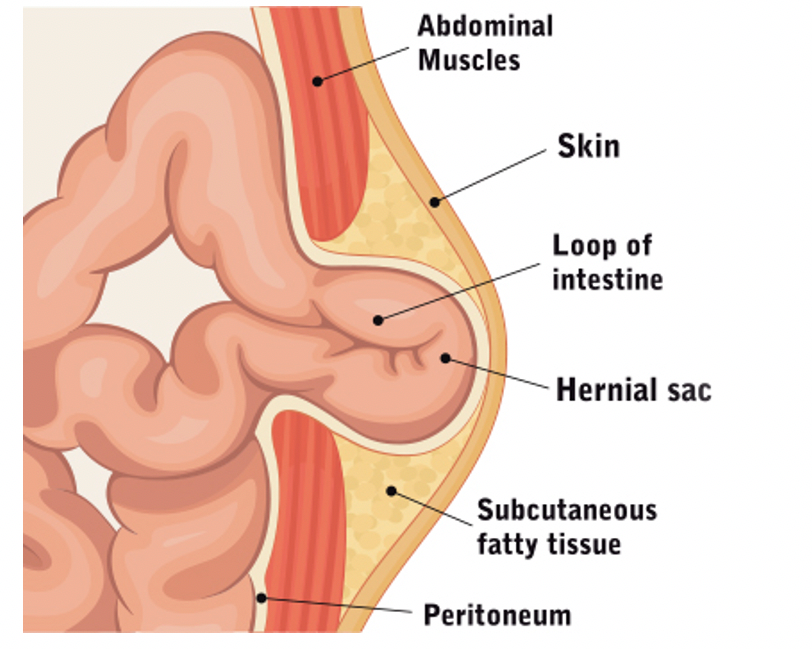
Hernia: Types, Symptoms & Treatment
Hernia is a medical condition. An organ or fatty tissue pushes through a weak spot in the muscle or tissue wall.
This creates a noticeable lump or bulge. These weak spots can be found in various parts of the body, with the most common areas being the abdomen and groin.
Hernias can vary in size and symptoms; some cause pain, while others may go unnoticed.
Imagine a wall with a weak spot; now picture something pushing through that weak spot.
This is similar to what happens in your body with a hernia.
The “wall” is your muscle or tissue, and the “something” could be an organ or fatty tissue pushing through.
Hernias can affect anyone, from children to adults.
And it’s a condition that rarely goes away on its own. In fact, they often enlarge over time.
Surgery is the only definite treatment for hernia.
Let’s look at common hernia symptoms
If you’re aware of your hernia symptoms, you can consult with the doctor, get a proper diagnosis. And get the treatment before it gets serious.
Here are some common hernia symptoms
Visible bulge or lump: Often seen or felt in the groin, abdomen, or chest.
Pain or discomfort: Especially noticeable during physical activity or when lifting heavy objects.
Feeling of heaviness: Pressure or weakness in the affected area.
Digestive issues: Such as heartburn, difficulty swallowing, or feeling full quickly.
Aching or burning sensation: A dull ache or burning in the affected area.
Pain during coughing or bending: Coughing or bending may make the pain worse.
Gurgling sounds: Sometimes, noises can be heard from the hernia area.
No symptoms: Some hernias do not cause noticeable problems initially.
If a hernia worsens, you may get severe symptoms like intense pain, nausea, vomiting, or a red or purple bulge. These symptoms signal the need for immediate medical attention.
If you feel any of the above symptoms, then don’t delay. Hernia treatment on time means a lot less trouble down the road.
So what are the types of hernias?
There are 5 types of hernia, each has its unique characteristics.
Identifying the types helps in taking better precautions and managing them.
Let’s look at each type.
Inguinal Hernia: This is the most common type. It occurs in the groin area and typically affects men.
Femoral Hernia: This also occurs in the groin area but is lower down and is more common in women.
Umbilical Hernia: This is located around the belly button. It is common in infants but can also affect adults.
Incisional Hernia: This occurs at the site of a previous surgery where the scar tissue is weaker.
Hiatal Hernia: This occurs when part of the stomach pushes up into the chest through an opening in the diaphragm.
Treating Hernias
Surgery is the only definite treatment for hernia. Yet, not all hernias need immediate intervention. In such cases, you have to continuously watch your situation. And avoid activities that could worsen the condition.
There are two main types of surgeries.
Open Hernia Surgery: The surgeon makes a cut near the hernia. Pushes the tissue back in place. And sewing the weak area, sometimes reinforced with mesh.
Laparoscopic Hernia Surgery: This is a minimally invasive method. The surgeon makes small incisions using special tools with a camera. This results in less pain, better healing, and quicker recovery.
Dr. Shashank Shah is known for his expertise in laparoscopic hernia surgeries. We use some of the most advanced tools and technologies. It ensures minimal pain. Most people go home on the same day. And patients return to their normal activities much faster.
How to prevent Hernias
While you can’t prevent all hernias, there are ways to lower your risk.
Here’s what you can do:
- Maintain a healthy weight so there is less pressure on the muscles
- Lift heavy objects properly (using your legs, not your back).
- Eat a fibre-rich diet and drink a lot of water to avoid constipation.
- Avoid smoking, which can cause chronic coughing.
- Exercise regularly to strengthen core muscles.
Living with a Hernia
In case you do not need immediate hernia surgery, here are some tips for managing. However, consult with your doctors. Many times, it gets serious and you might not even be aware of it … until it’s too late.
Here are a few things you can do to reduce the risk.
- Avoid lifting heavy objects.
- Wear loose, comfortable clothing.
- Maintain a healthy weight.
- Use ice packs for pain relief.
- Consult your doctor about safe exercises.
Remember, hernias are common. They are usually not dangerous, but they require attention as they do not resolve on their own.
If you suspect a hernia, consult a doctor now, get the diagnosis and see what’s the best treatment for you.
If you need surgery, then don’t worry. It’s a routine procedure with a quick recovery for most people.
Dr. Shashank Shah is one of the best hernia surgeons in India. He even holds the world record for performing 45 hernia surgeries in 10 hours.
Book your consultation with Dr.Shashank Shah at the following locations in Mumbai & Pune

